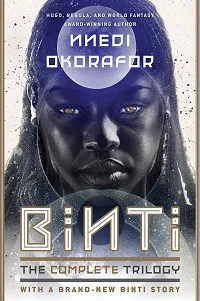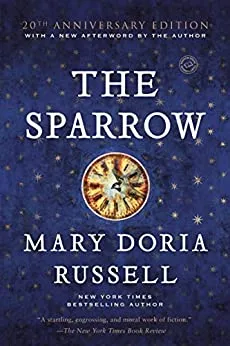
How I’m Decolonizing My Sci-Fi Reading
As bookish people, we are all mostly aware on some level that the diversity of the publishing industry doesn’t reflect the diversity of the country, much less the English-speaking world. Back at the beginning of 2018, I stopped reading books by cis-het white men because they are over-represented in publishing. Since then, I’ve made a concerted effort to read more authors of color, although I confess that at the moment my obsession with cozy mysteries and audiobook thrillers has skewed my stats toward white women — something I am focused on changing for 2022.
One of my favorite genres is science fiction. I dearly love a good space story, but it is a tenet of the very sub-genre that it deals with colonization, often as a result of the “speculation about possible future events, based solidly on adequate knowledge of the real world, past and present, and on a thorough understanding of the nature and significance of the scientific method,” to quote Robert Heinlein. To put it another way, science fiction is what happens when we imagine what humans would do with more technology than we currently have. Based on the way that humans interact with technological developments, it is a fair bet that we as a species would attempt to disseminate our way of life to other places and — if they exist — beings. And that, my friends, is colonization.
Science fiction is, at its core, an exploration of the human psyche and condition, particularly as it interacts with science and technology. It is a way for readers to plumb the depths and scale the heights of what could happen if we were not, for all intents and purposes, limited to Earth and occasionally the Moon. What if our technology was other worldly? What if we could reach other planets? And most importantly, what if those other planets were already home to cognizant forms of life? How would we adapt, survive, and thrive?
The work of decolonizing one’s reading is both challenging and rewarding. I strongly recommend starting your journey with Senjuti Patra’s excellent essay, Decolonizing Your Bookshelf. As I researched and thought about how to address the challenge, I realized that in my experience, nowhere is that dominant culture/colonization narrative more clear than in the science fiction genre.
One of the ways I am working to decolonize my science fiction reading is to diversify it. White cisgender male authors are vastly over-represented in science fiction, and they come from the dominant gender and race of the English-speaking world, whether they are consciously buying into the narrative or not. A good way to mitigate that narrative is to read it from different perspectives, and those perspectives are usually written by authors who are either non-white and/or not male.
If you haven’t yet read the Binti trilogy of novellas by Nnedi Okorafor, it is an excellent place to start. As an author, she specifically identifies with Africanfuturism, which is a genre (along with Afrofuturism) that has been regularly blowing my mind since I was introduced to it. Our heroine, Binti, has been accepted at a prestigious university off-planet, but her journey is interrupted when her ship is attacked and she is the only survivor. The series handles interspecies biases, what it means to broker peace, and what happens when the fate of worlds rests on the shoulders of one young woman. Reviews are full of phrases like “ground-breaking” and “unique,” and I wholeheartedly agree.
When science fiction mixes directly with philosophy, the result is a book that directly addresses the results of a colonialist mindset. In other words, you get The Sparrow by Mary Doria Russell, which happens to be one of my top five favorite books of all time for this very reason. The Sparrow shifts between the discovery of radio waves from another planet and how the Jesuits were the first to fund and send an exploratory party to Rakat, and the return of the party’s sole surviving member, Father Emilio Sandoz. It dissects the arrogance of humans — even the best-intentioned ones — when encountering non-humans, and asks the reader to consider the ramifications of not diversifying our points of view.
Another direction I’ve explored when decolonizing my science fiction reading has to look for narratives about humans and the machines we build to imitate us. The work of Chen Qiufan does this with fascinating results in his short story, “State of Trance” from The Book of Shanghai. Ultimately, the “man vs. machine” trope is an exploration of how humans handle accelerated change, especially when that change is the result of our own exploration and creation. This is the least “colonial” kind of science fiction narrative, at least on the surface. But often “man vs. machine” deals with classist colonial structures, using different levels of technological enhancement to differentiate between classes.
If you are an avid science fiction reader and lover of space stories like I am, I’ll be honest: it can be difficult to truly decolonize your reading due to the widely accepted narrative that humans are the heroes of the story with a superior and scrappy survival instinct, bringing a “human touch” to new lands. The broadest and simplest beginning of the endeavor is to work on two aspects: first, diversify your reading in terms of the race, gender, and original language of the authors you choose. Different cultures have differing narratives about colonization, and those are represented in the work of that culture’s authors. Second, learn to recognize colonialist tropes in your reading. Think about why they may appeal to you, and what you can learn from that realization.
And, as Senjuti mentioned, learn to connect the dots between all of the books you’re reading. After all, fiction — even science fiction — is not immune from the effects of the kyriarchy in which we all live and breathe.
For help on your own path to decolonizing your sci-fi (and other!) reading, here are some recommendations:













